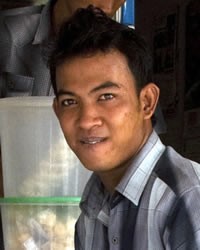Java Pesisir Kulon in Indonesia

Photo Source:
Danumurthi Mahendra - Flickr
Creative Commons
|
Send Joshua Project a map of this people group.
|
| People Name: | Java Pesisir Kulon |
| Country: | Indonesia |
| 10/40 Window: | Yes |
| Population: | 5,381,000 |
| World Population: | 5,381,000 |
| Primary Language: | Javanese |
| Primary Religion: | Islam |
| Christian Adherents: | 2.00 % |
| Evangelicals: | 0.16 % |
| Scripture: | Complete Bible |
| Ministry Resources: | Yes |
| Jesus Film: | Yes |
| Audio Recordings: | Yes |
| People Cluster: | Java |
| Affinity Bloc: | Malay Peoples |
| Progress Level: |
|
Introduction / History
The Java Pesisir Kulon (West Coast Java) people group is also known as Java Cirebonan or the Cerbon people. They live primarily in the West Java Province of Indonesia, mostly in small cities like Patrol, Anjatan and Haurgeulis. Some live to the east around the vicinity of the Sanggarung River, as well as across the river where there are several Cirebonan villages located in the province of Central Java.
The Java Pesisir Kulon speak a version of Javanese called Java Ngoko Cerbon, a mixture of Javanese and several other languages. The Java Pesisir Kulon people group live in Sunda districts, yet they use the Java Ngoko Cerbon (Jawa Cerbon) language. This language is apparently a mixture of several other local languages. The Cerbon Ngoko language is taught to every Cerbon child from first through tenth grades.
What Are Their Lives Like?
One of the names for this group, Cirebonan, comes from two words meaning water and shrimp. Cirebon has always been famous for its salted fish and fresh shrimp, as well as shrimp pastes used as spices. Most Java Pesisir Kulon make their living fishing or farming. Their fertile land produces coffee, sugar, tobacco, citrus fruits and the Dermayu mango. Craftsmen make various products from the world-famous batik cloth, as well as clay, wood and rattan. Others work in government or private institutions.
The city of Cirebon is considered a tourist destination because of the many historical and sacred landmarks. These historical sites include several palaces, Mesjid Panjunan (a mosque), Gua Sunyaragi (a cave) and Panjang Jimat (a place of mystical meditation).
The Java Pesisir Kulon people tend to be open and spontaneous in their social interactions. Islam forms their national cultural foundation, taking precedence over the traditional Java cultural values that are still predominant in Central and East Java.
What Are Their Beliefs?
Sunan Gunung Jati (1448-1580), one of the Nine Apostles of Islam in Indonesia, used Cirebon as a base to spread Islam. As a result, the people take great pride in their Muslim beliefs and heritage. The large majority of the Java Pesisir Kulon people follow Sunni Islam, with a minority adhering to the more mystic Sufi Islam.
As is common among people groups in the area, the Java Pesisir Kulon mix their Islamic beliefs with occult practices. They rely heavily on Dukuns (shamans/healers/occultists), who among other duties lead various ceremonies including ritual meals to obtain happiness, safety and peace.
What Are Their Needs?
The Cerbon region has much potential for economic development and increasing productivity. The people need more equitable opportunity for benefits from this development; currently, the living standard of the masses remains fixed at about $50.00 per month. They need quality practical, vocational training and teaching, including appropriate technology. Present industries need to be expanded and the transportation infrastructure must be developed to better enhance the marketing of their products.
Prayer Points
Ask the Holy Spirit to free the Java Pesisir Kulon from the impact of the occult. Pray for a hunger for truth that will lead them to Jesus Christ.
Thank God for the availability of the Bible in Javanese; pray that God will lead many of the people to encounter Scripture and recognize its truth.
Ask God to send loving workers to the Java Pesisir Kulon to share the gospel with them and bring modern education and infrastructure.
Pray for a people movement to Christ among the Java Pesisir Kulon to develop within the next decade and spread to neighboring people groups.